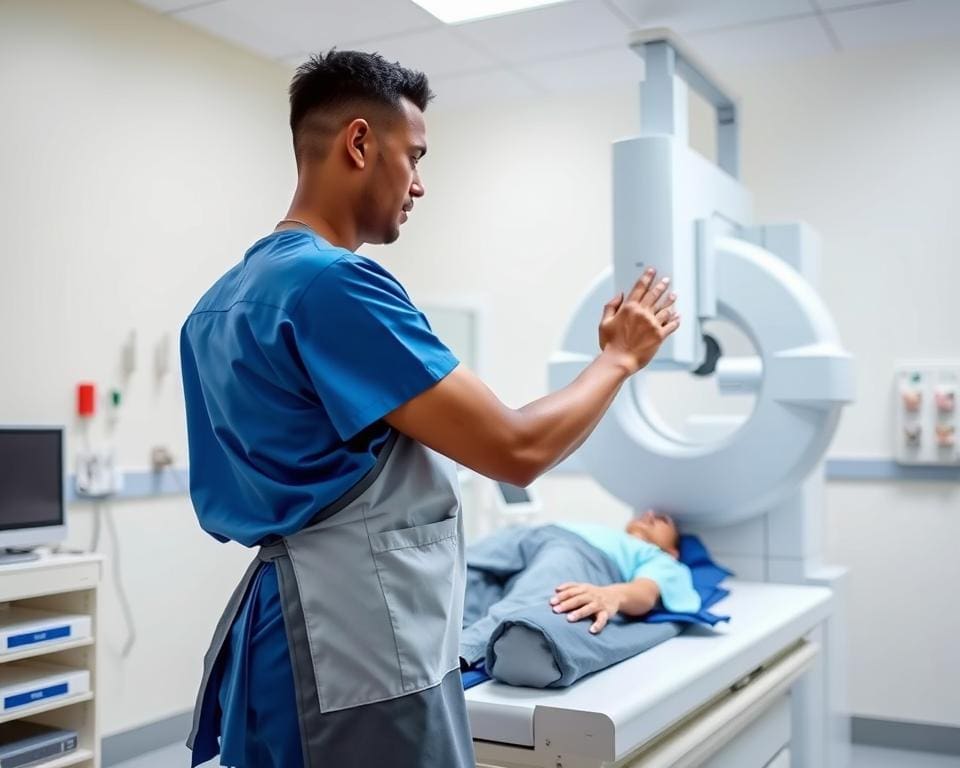The field of healthcare offers numerous career opportunities, and a radiology technician career stands out for its blend of technical prowess and patient interaction. Radiology technicians, also known as radiologic technologists, are essential in medical imaging, operating equipment such as X-ray machines, MRI machines, and CT scanners. Their expertise not only aids in diagnosing medical conditions but also supports effective treatment plans. If you are considering how to become a radiology tech, this guide will serve as a roadmap. It will outline the needed skills, qualifications, and steps you must take to embark on this fulfilling journey in the healthcare sector.
Understanding the Role of a Radiology Technician
The role of a radiology technician is vital in the healthcare ecosystem, focusing on the delivery of crucial diagnostic services. These professionals are qualified medical imaging specialists, skilled in operating advanced imaging equipment. Their work ensures that patients receive accurate images necessary for proper diagnosis and treatment.
What is a Radiology Technician?
A radiology technician, often referred to as a radiographer, operates equipment such as X-rays, CT scans, and MRI machines. This role involves not only technical proficiency in handling these machines but also a solid understanding of anatomy and patient care practices. Radiology technicians play a key role in the healthcare team, bridging the gap between patients and physicians.
Key Responsibilities of a Radiology Tech
Radiology tech responsibilities encompass a variety of tasks that are essential for effective patient care. Some of the primary duties include:
- Preparing patients for imaging procedures by explaining processes and answering queries.
- Positioning patients appropriately to capture the desired images clearly.
- Ensuring safety protocols are followed, including the correct usage of lead aprons and shielding devices.
- Maintaining equipment and performing routine quality checks to ensure optimal function.
- Collaborating with healthcare professionals to interpret and communicate results clearly and efficiently.
Through these responsibilities, radiology technicians ensure the delivery of high-quality medical imaging, playing a crucial role in assisting healthcare providers to diagnose and treat illnesses effectively.

How To Become A Radiology Tech
Embarking on a career as a radiology technician is an exciting journey filled with opportunities to make a significant impact on patient care. Understanding the essential qualifications for radiology tech and the necessary skills for radiologic technologist can provide a solid foundation for aspiring professionals. This section outlines the qualifications required and the key steps to become a radiologic technologist.
Essential Qualifications and Skills Required
The pathway into radiography typically begins with obtaining relevant educational qualifications. Most aspiring radiology technicians require a minimum of a diploma or degree in radiologic technology. Apart from formal education, certain skills are vital for success in this field. Essential skills for radiologic technologist include:
- Strong communication abilities to effectively interact with patients and healthcare staff.
- Analytical thinking for accurately interpreting medical images.
- Interpersonal skills to provide compassionate care and comfort to patients.
Key Steps to Start Your Radiography Career
To begin the journey towards becoming a radiologic technologist, individuals should follow a structured approach. The steps to become a radiologic technologist include:
- Researching accredited training programmes in radiographic technology.
- Applying to suitable courses that align with personal and professional goals.
- Seeking entry-level positions or internships to gain practical experience in the field.
Radiology Technician Qualifications
Entering the field of radiology requires a firm understanding of the educational requirements for radiology techs, which set the stage for success in this rewarding career. Meeting these requirements is essential for individuals aiming to thrive as radiology technicians.
Educational Requirements for Aspiring Radiology Techs
A strong educational foundation is vital for those who wish to become accomplished radiology technicians. Typically, candidates must complete a diploma or degree in radiography. This educational pathway often includes subjects such as anatomy, radiologic physics, and patient care. Such a curriculum not only equips students with technical skills but also enhances their understanding of patient interactions and imaging technology.
Importance of Accreditation in Radiography Programs
Attending accredited radiography programs is crucial for aspiring professionals. Accreditation ensures that the educational institution meets strict quality standards, thereby reinforcing the credibility of the qualification. Graduates from accredited programs are more likely to possess the comprehensive knowledge necessary for providing high-quality patient care. Accreditation also significantly improves career prospects, as employers tend to favour candidates with qualifications from recognised programs.
Radiologic Technologist Training Programs
The journey to becoming a successful radiologic technologist begins with the right training. Understanding the various training programmes for radiology techs is crucial for aspiring professionals. Each programme offers unique specialisations that align with individual career aspirations.
Types of Training Available
A range of options exists for those pursuing radiologic technologist training. The main types of programmes include:
- Associate degrees in radiologic technology, providing a foundational education and clinical experience.
- Bachelor’s degrees, offering a more in-depth study and advanced skills.
- Diploma courses, which are often shorter but focus on essential hands-on training.
These programmes may feature specialisations such as X-ray technology, MRI, and CT imaging, catering to specific interests in the field.
Duration and Structure of Radiologic Training
The duration of radiologic training varies based on the programme chosen. Typically, training can last from one to four years, depending on whether students opt for a diploma, associate, or bachelor’s degree. Each programme is structured to include:
- Classroom instruction that covers theory and essential knowledge.
- Clinical experience, allowing students to apply their skills in real-world healthcare settings.
Such a comprehensive approach equips future radiology techs with the skills needed to excel in their careers and ensure they are well-prepared for the challenges ahead.
The Role of Certification in Your Career
Certification plays a crucial role in the career path of a radiology technician. It serves as formal recognition of skills and knowledge within the field, setting a benchmark for excellence. Understanding the radiology tech certification requirements can greatly enhance job prospects and professional credibility within the healthcare industry.
Radiology Tech Certification Requirements
The radiology tech certification requirements typically include the completion of an accredited educational programme and passing a certification examination. Most employers favour candidates with certification, as it reflects a commitment to maintaining high standards in practice.
- Completion of an accredited radiography programme
- Successful completion of a certification examination
- Ongoing professional development to maintain credentials
Popular Certification Boards and Their Credentials
Several certification boards for radiologic technologists ensure that professionals meet rigorous standards. Two notable examples include:
- The Health and Care Professions Council (HCPC), which regulates professionals and maintains high standards of education and practice.
- The Society of Radiographers (SoR), which offers credentials for radiology techs and promotes professional development.
Attaining certification from these boards not only boosts a technician’s credentials but also contributes to the overall quality of patient care in radiology.
Pathways to Specialisation in Radiology
Embarking on a radiology career opens a world of opportunities for those seeking specialisation in radiology. With the advancement of technology, fields such as MRI technology, computed tomography (CT), and ultrasound imaging have become vital components of modern medical diagnostics. These specialisation options not only expand a technician’s skill set but also provide the chance to delve deeper into particular areas of interest, enhancing both career satisfaction and professional confidence.
Advanced radiology training plays a crucial role in this journey. Not only can it lead to improved job prospects and higher salaries, but it also equips technicians with the knowledge needed to stay abreast of rapid developments in imaging technologies. Pursuing further education and obtaining specialised certifications can significantly impact a radiology technician’s career trajectory, positioning them as experts in their chosen field and making them invaluable assets to healthcare teams.
As the demand for advanced imaging techniques continues to rise, the landscape of radiology career pathways is ever-evolving. Continuous learning and skill enhancement are essential to remain competitive. Whether through formal education or on-the-job training, aspiring specialists should actively seek out opportunities to specialise and refine their expertise. This commitment to personal and professional growth will not only bolster individual careers but also contribute to the overall advancement of the radiology field.









